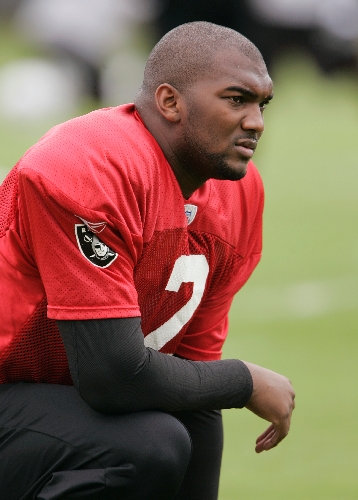Rookie wage scale overdue

A junior running back at Texas or a sophomore offensive lineman at Alabama or a senior wide receiver at Southern California is going about his business today, working out and preparing for another college football season as a certain future pro.
He also reportedly is the final hurdle from ending the NFL lockout.
If this is the only point of contention remaining between owners and players putting the final touches on a new collective bargaining agreement, then hand each side a shiny pen and get on with it.
A rookie wage scale in the NFL is more overdue than the cancellation of “Survivor.”
If we are down to the minor detail of whether a rookie class becomes free agents after four or five years, flip a coin and end this thing.
In the grand scheme of unproven players becoming set for life financially overnight, this is all about preventing another JaMarcus Russell-type contract.
The Raiders made him the draft’s first selection in 2007 and rewarded Russell a $61 million deal, $32 million of which was guaranteed before he took an NFL snap.
He then played three seasons with Oakland and went 7-18 as a starter.
He then was released.
Russell most often is held as the shining example of the bad business practice of paying rookies boatloads of cash for the pleasure of their signature. Handing out millions in guaranteed money for potential alone has been one of the worst mistakes made over the years by a league that doesn’t make many.
It’s also not reality.
The doctor fresh from medical school doesn’t make the same as a 15-year cardiologist with his own practice. The supporting actor doesn’t make as much as the leading man. Chris Petersen doesn’t make as much as Steve Spurrier to coach football.
OK, so the theory doesn’t always make sense.
But there is perhaps no other profession where a lack of proven ability is compensated so excessively as a first-round NFL Draft pick. It’s wrong in so many ways.
Football at its lowest levels is a violent game. Football at the highest level cuts years off lives. Your mailman has an average life expectancy of 75. Your favorite NFL player who has been in the league at least four seasons has one of 55. It doesn’t leave a lot of time to spend all that money.
It’s also another reason the league needs to take some of the cash saved by cutting rookie compensation and set up that legacy fund for retired players from the pre-1993 days, for those who made it possible for the stars of today to make their millions. They paved the way, generated the interest, created the first parts of the monster that is today’s NFL.
“I always supported a rookie wage scale,” said Jim Fassel, coach of the Locomotives who guided the New York Giants to Super Bowl XXXV. “Think about it: A guy who has played four to five years and is a good player and starter doesn’t make as much as the college player who is given a huge signing bonus of guaranteed money.
“… There needs to be an adjustment. Guys have to prove themselves in high school and then in college and then should have to do it again in the pros. It’s not right when guys who haven’t played a down yet are making more than 90 percent of your team.”
One sentence I never imagined typing: The NFL for some time now could have learned a huge lesson from the NBA.
In basketball’s rookie scale, agents are taken out of the negotiating equation, and their pockets aren’t as heavily lined, which should be incentive enough to make this happen in football.
Bonuses and salaries depend on draft position. Incentives are decided on performance. Extensions aren’t offered until following a player’s third season.
Translation: Guys still get paid well — a late first-rounder under such an NFL scale would be looking at a signing bonus of $1.5 million — but those who work harder and prove themselves to be productive players would reap the benefits of such skill with their next contract.
The league doesn’t want that time to come until following a fifth season. The players want it following a fourth. It’s not a big enough reason to stall negotiations any further.
If all that stands in the way of ending this lockout is agreeing to terms of a rookie wage scale and taking care of retired players, flip a coin and hand out the pens.
More than anything else, get on with it.
Las Vegas Review-Journal sports columnist Ed Graney can be reached at egraney@reviewjournal.com or 702-383-4618. He can be heard from 3 to 5 p.m. Monday and Thursday on “Monsters of the Midday,” Fox Sports Radio 920 AM. Follow him on Twitter: @edgraney.